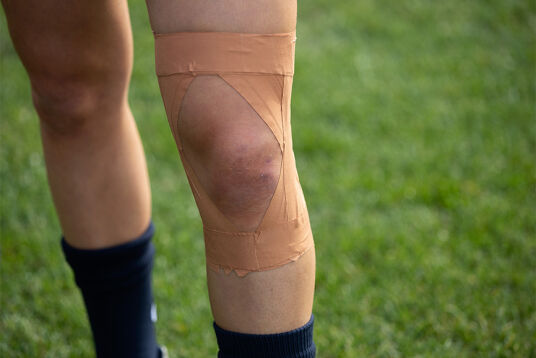Sports & Rehab
Essential Sport First Aid Items to Have on the Sideline
June 07, 2022

Accidents and injuries on the sports field happen, and when they do it pays to ensure that you are prepared.
In New Zealand, Sport Clubs regardless of how big or small and whether the club has employees or volunteers, should have plans in place to manage health and safety for its members (Sport New Zealand, 2022). This should include having a nominated coordinator, and a procedure to provide effective first aid or emergency treatment if required.
Being able to provide effective first aid treatment starts with being prepared and having access to the appropriate items. We outline three essential considerations for your club or you as an individual, to ensure you have the items you need and can provide first aid and emergency treatment on the side-line.
1. Ensure you have a sport specific first aid kit
Does your sports club have a first aid kit that’s fit for purpose and if they don’t do you have one on hand that can meet the needs of your family in a sports emergency. While having any First Aid Kit to hand is better than none, a sport specific First Aid Kit will ensure you have the items you need to provide side-line treatment. Sport specific First Aid Kits include practical products specific to injuries and accidents seen on the sideline.
As some form of first aid treatment will often occur during a game, the kits will generally include larger quantities of the commonly used items such as wound care products (plasters and dressings) and saline solution, along with sports tapes which can be used to secure dressings or give support to an injured or sprained joint.
Look for a kit that will provide coverage for a full team and is well stocked with key first aid items such as non-adherent pads, sterile dressings, and dressing strip. If your sports club does not have one on site consider keeping your own car kit or one in your sports bag.
2. Ensure you have access to emergency care equipment
Emergencies on the field do happen and having life-saving equipment on hand or nearby can make all the difference. While not all accidents will be a matter of life-or-death, it does pay to be prepared.
Studies have shown that being able to access a defibrillator is a key factor to surviving out of hospital cardiac arrest events (Jones, 2019). AEDs monitor a hearts rhythm, and if required deliver an electric shock to help restore the hearts natural rhythm (St John New Zealand, 2022). By having access to an AED in the event of a cardiac arrest, it increased the chance of survival by up to 44%. In the past few years, more attention has been given to the access to AEDs in the community, with specific attention on sports grounds and clubs.
Other emergency care equipment to consider having on hand include items like Pocket CPR masks, Splints, and Stretchers.
3. Can you provide RICED treatment?
Basic sport injuries can often be managed with simple RICED treatment, which focusses on applying cold therapy, along with rest, compression, and elevation.
While you can provide sideline RICED treatment through specific kits, this can also be achieved by having instant ice packs on hand. Instant ice packs require no freezing and deliver immediate cold therapy once activated which makes them ideal for use on the sideline. Most sport specific First Aid Kits will include instant ice packs.
An ounce of prevention is worth a pound of cure goes the old saying by Benjamin Franklin and we could equally replace the word prevention with preparation. Make sure your sports club is prepared by checking what they have on hand. If they don't have the budget or haven't taken this precaution then consider what you can do to take the initiative yourself.
More related articles

Sports tape: Your guide to what, where and how
April is here and for winter sports enthusiasts it signals the start of team trials and pre-season training. The last two seasons have effectively been cancelled, so it is understandable that a lot of us will be champing at the bit to get back out there.

